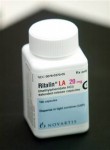Brain “Steroids” – Cognitive Enhancement Drugs
 Students popping “smart” pills before exams? It’s happening with increasing frequency on both sides of the Atlantic, according to Students turn to smart drugs for exam help in The Scotsman. Students are increasingly using nootropic drugs, which include Ritalin, often prescribed for ADHD, and Donepezil, an Alzheimer’s aid.
Students popping “smart” pills before exams? It’s happening with increasing frequency on both sides of the Atlantic, according to Students turn to smart drugs for exam help in The Scotsman. Students are increasingly using nootropic drugs, which include Ritalin, often prescribed for ADHD, and Donepezil, an Alzheimer’s aid.
A number of clinical studies have shown that such smart drugs can produce significant mental gains in normal, healthy subjects.
Donepezil has been found to boost the brain function of healthy people by increasing the concentration of a neurotransmitter called acetylcholine, boosting the power of certain electrical transmissions between brain cells.
But neuroscientists warn that the long-term effects on healthy people are difficult to predict. Over time, they might cause people to remember too much detail, cluttering the brain and making it difficult to shift attention to a new task.
Whatever the risks, the usage of these drugs as cognitive enhancers is growing. Last year, a study of 119 colleges in the U.S. disclosed that up to 25% of those responding had used ADHD medication for reasons other than treating that condition.
The area of cognitive enhancement will present an interesting challenge for drug makers and marketers. There’s no doubt that a market exists for such products. Currently, the space is dominated by prescription drugs approved for other uses and supplements that have minimal regulation. The latter group includes products like ginkgo biloba, a reputed memory enhancer; these supplements generally don’t have serious research to back up their claims, and aren’t subject to rigorous safety testing. It’s clear that if a well respected pharmaceutical firm like Pfizer or Lilly introduced a product with credible research both demonstrating cognitive benefits in healthy adults and indicating a high probability of safety when used properly, they would sell carloads.
Our society today is increasingly performance-driven. People believe that getting into the right college is critical for career success, and the admission process for elite schools has become insanely competitive. Once in college, the competition doesn’t end for those hoping to attend a top professional school – they, too, will need superb academic records and test scores. And after graduation, the competition in the business world can be intense – the ability to be a bit sharper than the next person, and perhaps work longer with less fatigue, might mean winning the promotion race. In each case, a safe cognitive enhancer would be highly sought after.
The field of neuroethics is already starting to think about the issues raised by cognitive enhancers. Michael Gazzaniga’s The Ethical Brain devoted space to evaluating the pros and cons. While in athletics the use of performance enhancing drugs is controversial and almost universally forbidden, the future of cognitive enhancers looks a bit more promising if they can be shown to be safe and effective. There’s too much momentum and potential demand for that not to be the case. Beyond pressured students and professionals, there’s an entire generation of baby boomers concerned about cognitive decline. These boomers are already experimenting with brain fitness ideas, and will be standing in line at the pharmacy if drug makers can meet their real and imagined needs.
